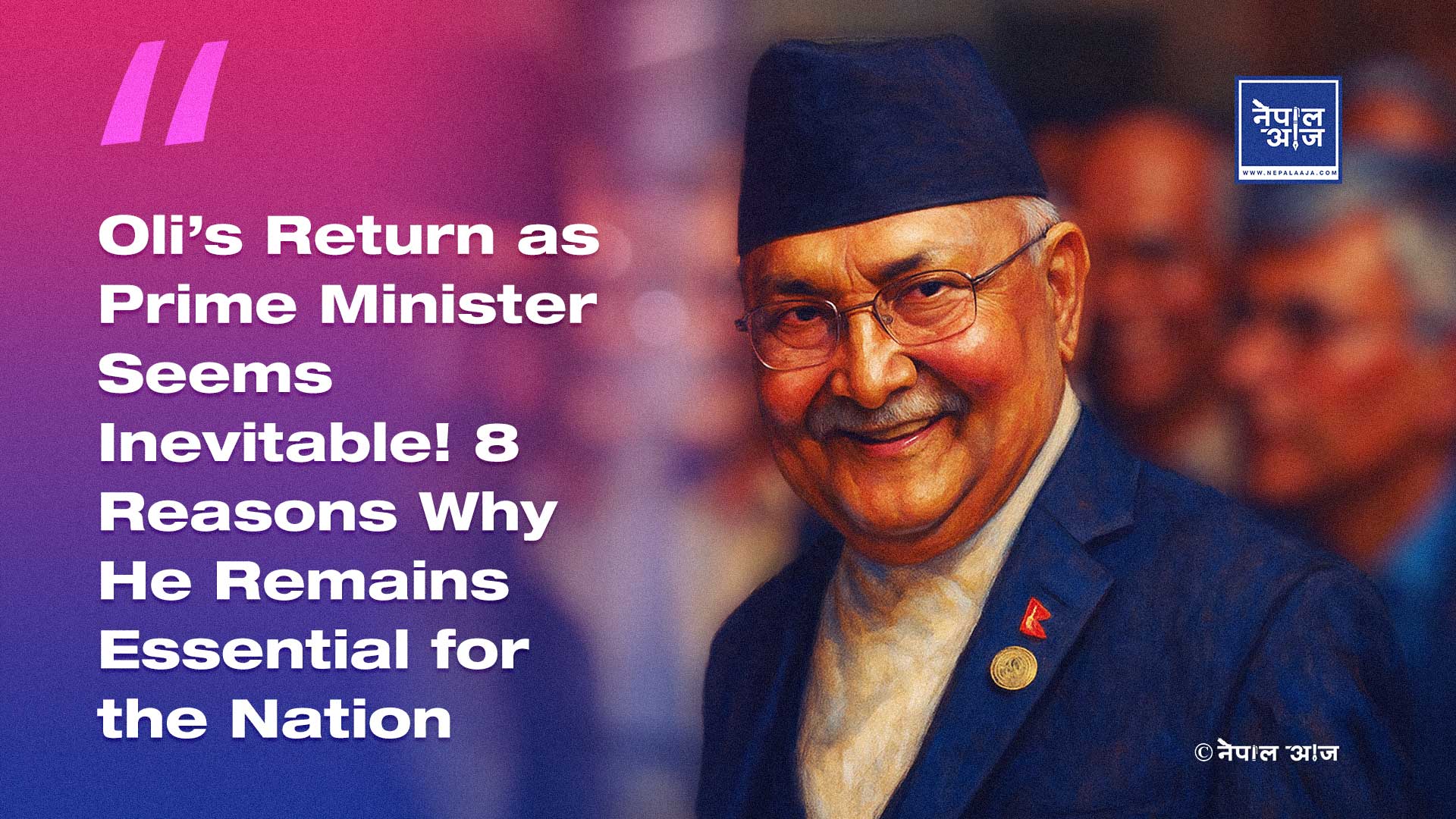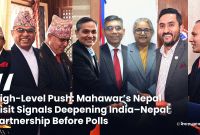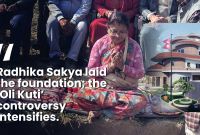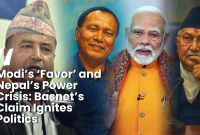Gen Z Movement Defeated Oli, But the Nation Still Seeks Him!

Deposed Communist Prime Minister Khadga Prasad Sharma Oli stands as an extraordinary and enigmatic name in Nepal’s contemporary political landscape — a figure who not only exercised power but also reawakened the nation’s psychology with renewed hope, pride, and identity. Merely uttering his name resonates across generations — from children to the elderly, men to women, teachers, doctors, priests, shamans, and even the mystical creatures of folklore. From nationalists to critics, communists to non-communists — everyone recognizes the name “Oli.” Fluent in Sanskrit verses, folk tales, poems, puns, and proverbs, the eloquent and self-assured former Prime Minister redefined not just politics but also the aesthetics of oratory, nationalism, and self-respect.
After the Gen Z movement, while many across the world called for his retirement from politics, there are reasons why Oli must return once again to lead the nation. Nepal’s development, many argue, is impossible without him. Only Oli, they say, can bring joy and progress to every home. His unfinished vision cannot be realized even in 50 years, and for that reason — if necessary — the constitution should be amended to make him an executive president for life, much like Russia’s model. The following reasons explain why his leadership remains essential:
Reason 1: The Dream of Ships — A Symbol of National Pride
Who says a landlocked country cannot dream of ships? Oli did not search for an ocean; he inspired an ocean of confidence among Nepalis. Declaring that Nepal would one day have its own ships, he dared to redefine what was possible for a landlocked nation. He even established a Department of Ship Operation to begin that journey. Unfortunately, domestic and foreign adversaries, along with indifferent governments that followed him, buried this national project. Yet, that unfinished dream remains a generational duty — for Oli’s vision was not just about ships but about resurrecting national pride.
Reason 2: Gas in Every Home — The Revolution of Self-Reliance
In a country where taps reach every home but water doesn’t, Oli envisioned a pipeline bringing cooking gas directly to Nepali kitchens — a true revolution in energy independence. He pledged to end the age of firewood and gas cylinders, ushering in a modern era of convenience. But foreign reactionary powers and local political conspiracies stalled this plan. Under Oli’s leadership, that dream could revive — every household connected, every kitchen modernized, every Nepali self-reliant.
Reason 3: The “Chukche Rail” — Courage to Pierce Mountains
Ships and gas alone cannot build a nation. Oli dreamed of linking Nepal’s rugged hills with China through the “Chukche Rail” — a railway that symbolized connectivity, courage, and modernization. Yet, foreign pressure and domestic politics buried it halfway. Now, the people must ask: why was this vision left incomplete? Only a leader with Oli’s audacity can break through the mountains of inertia and lead Nepal toward a mobile, modern future.
Reason 4: Energy Independence — Our Own Fuel, Our Own Power
Oli envisioned drilling Nepal’s hidden petroleum reserves and lighting the nation with its own energy. It was not just an economic plan — it was a declaration of independence. Had that dream come true, the irony is that even the Gen Z protesters might have set fire to the streets with domestic fuel instead of imported oil. But foreign manipulation and internal betrayal derailed the plan. It’s time to revive that vision so that Nepal can burn its own fuel — this time to light the lamp of progress.
Reason 5: Trade Across the Himalayas — A Geo-Strategic Dream
Oli dared to open a new era of trade and infrastructure with China. His vision to carve tunnels and railways through the Himalayas aimed to transform Nepal from a landlocked to a land-linked country. By reducing dependency on India and expanding access to global markets, he sought to rewrite Nepal’s economic destiny. Yet, foreign interests and domestic sabotage halted this plan. But just as Mount Everest stands tall, so do Oli’s ambitions — undeterred, unbent, unfinished.
Reason 6: Defending the Map — Protecting National Identity
If Oli doesn’t return, the fear is that some might erase Kalapani and Lipulekh from Nepal’s map. Even if land is lost, the map symbolizes sovereignty. Oli immortalized that sovereignty by constitutionally amending Nepal’s map — an act hailed as a bold stroke of nationalism. In an age of virtual patriotism, only leaders like Oli breathe life into the lines that define Nepal. His return is not merely political; it’s existential for the nation’s identity.
Reason 7: The Irony of Reality — Turning Flaws into Strategy
Oli’s unique trait lies in turning impossibilities into achievements — and even flaws into political strategy. In a chaotic bureaucracy and fragile economy, he used corruption and power balance as “controlled disorder,” a tool for stability and momentum. Scandals from Omni to Lalita Niwas, Yeti, and Giribandhu reveal not just misconduct but the anatomy of power itself. Likewise, while thuggery remains morally wrong, Oli wielded it as an organizational identity — appointing loyalists, empowering enforcers, and sustaining party discipline. Like Rama preserving order after Ravana’s fall, Oli kept his “raksasas” alive to save the system from collapse. Ironically, corruption and rigidity remain intolerable — yet without Oli’s presence, even chaos risks losing direction.
Final Reason: A Symbol of Stability — A Leader Who Sees Beyond Generations
If experienced leadership like Oli’s does not return, his grand visions — from ships to rails, energy to trade — will fade into forgotten manifestos. In a culture of instability, his rule symbolized continuity and conviction. Without him, the nation faces unfinished dreams and institutional decay. To secure the next century’s vision for Nepal, the nation, many believe, still needs Oli — the emblem of experience, resolve, and political endurance.
Editorial Notice:
This article is not intended to be taken literally. The content should be read as metaphorical, satirical commentary, not as factual political endorsement.




![From Kathmandu to the World: How Excel Students Are Winning Big [Admission Open]](https://www.nepalaaja.com/img/70194/medium/excel-college-info-eng-nep-2342.jpg)
